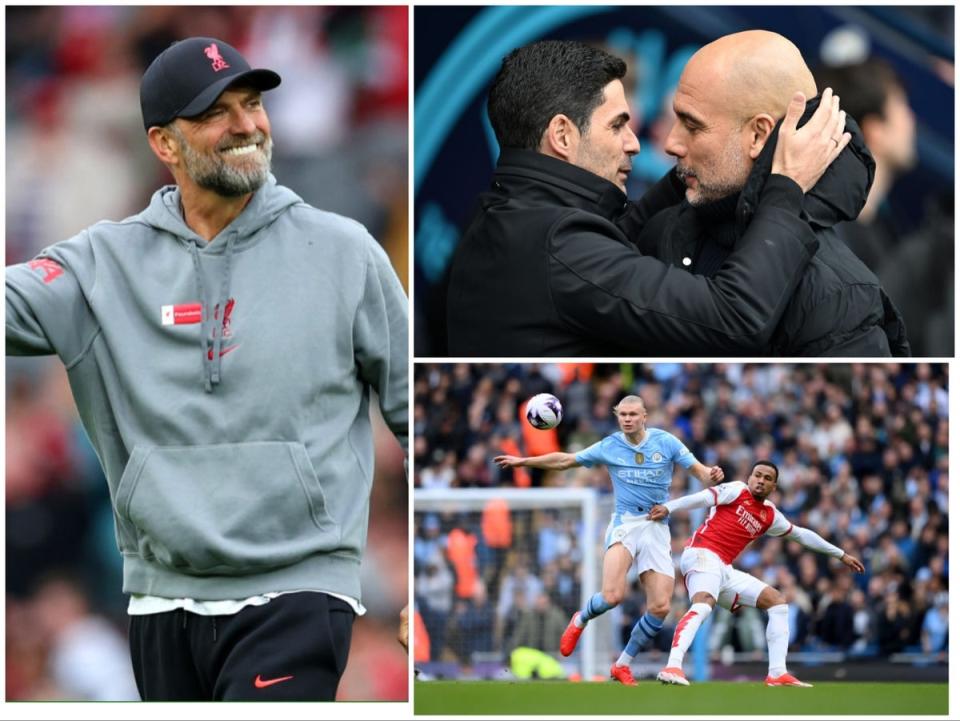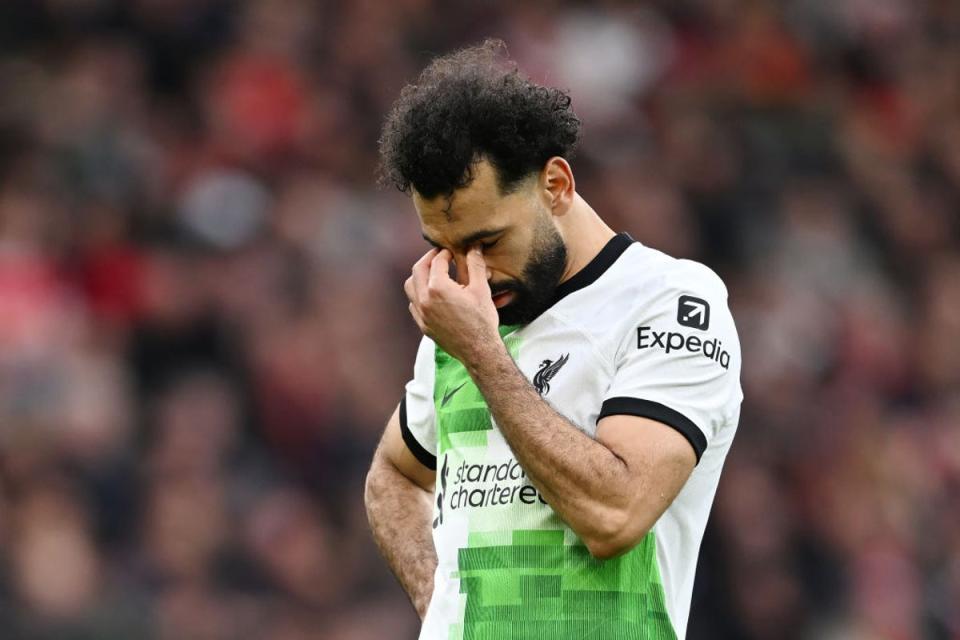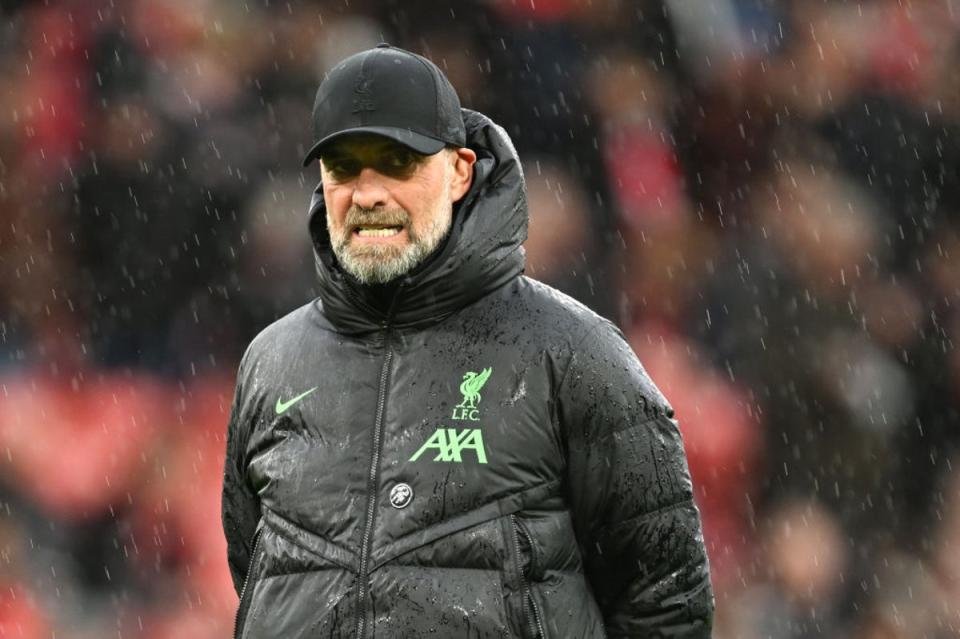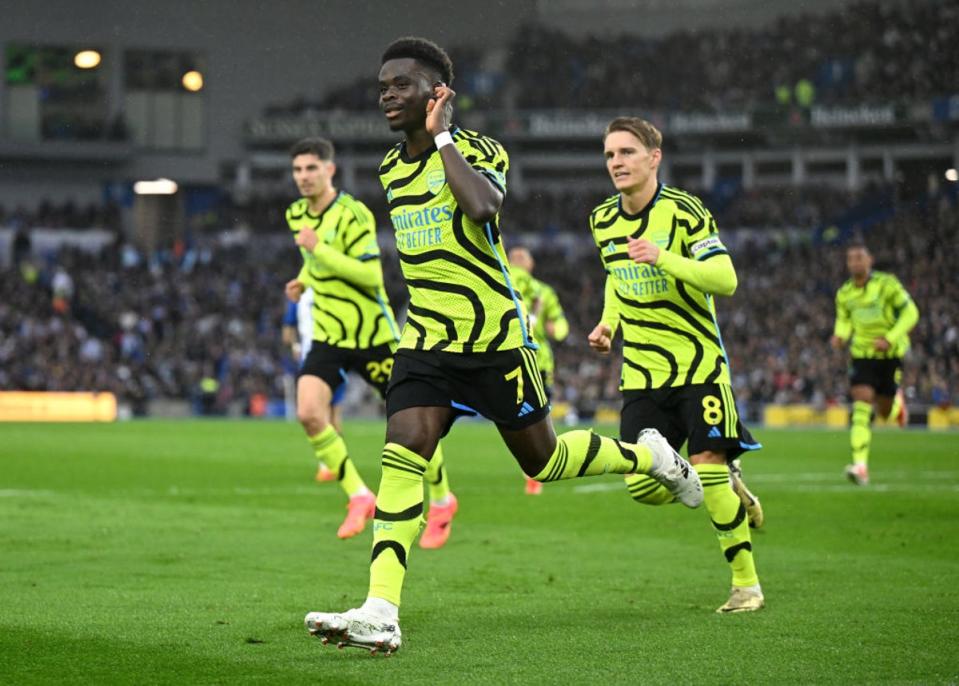Why this unprecedented Premier League title race is needed more than ever

Mikel Arteta, on this occasion at least, wasn’t going to play any mind games. When asked after Arsenal’s win over Luton Town whether he would be watching the matches of Manchester City and Liverpool, he nodded happily. There was no sense of just concentrating on his own team. Arteta said he simply enjoyed watching good football, but his interest was obviously far more invested than that.
As the gatecrasher to English football’s main title rivalry, Arsenal have the most to learn. Their very presence at the top of the table, however, also gives both Jurgen Klopp and Pep Guardiola something to learn. Neither managerial great has ever been involved in a three-team title race, across 38 combined seasons.
Both have admitted to feeling a new excitement about it, as well as a different tension. There’s a crackle, that sense of event in almost every match. You can feel that gripping tension before each game, and it’s now in three dressing rooms. As evenings stretch out and nerves tighten, there’s nothing like it.
There’s certainly been little like this in English football, let alone in the Premier League era. A storied 124 seasons since the league’s formation in 1888 have only witnessed 11 campaigns where there were three teams which could have considered themselves involved in a proper title run-in. Only seven of those involved at least three sides finishing within a win of each other on the final day.
They were:
1902-03: one point between champions The Wednesday (now Sheffield Wednesday) and Aston Villa and Sunderland
1904-05: two points between champions Newcastle United and Everton and Manchester City
1928-29: two points between champions The Wednesday and Leicester City and Aston Villa
1946-47: two points between champions Liverpool and Manchester United, Wolves and Stoke City
1949-50: one point between champions Portsmouth and Wolves and Sunderland
1959-60: two points between champions Burnley and Wolves and Tottenham Hotspur
1971-72: one point between champions Derby County and Leeds United, Liverpool and Manchester City
The closest the Premier League has had was two seasons when four points separated top from third, although neither would see all three going into the final day. The last of those was 2013-14, when Jose Mourinho’s Chelsea fell away the week after inflicting the decisive defeat on Liverpool, a result that handed the title to Manchester City. The other was 2007-08, when Arsenal were never quite close enough to Chelsea and title winners Manchester United.
You have to go back more than five decades for the last time it really went to the wire, and that was the most famous multi-race of all. That wasn’t legendary because of the frenetic situation that saw the leadership change twice in the last two weeks and two of the top three play each other, with three still capable of winning it on the last day. It was actually due to the disorganised nature of the fixture list which ensured Brian Clough’s Derby County spent that last day on the beach in Mallorca. They had already beaten title rivals Liverpool in their own final game, with John McGovern scoring the only goal.
“A game in which,” Clough wrote in his vintage style, “we played Stevie Powell at right-back at the tender age of 16. How many managers, how many clubs would have been prepared to do that? Clough and [Peter] Taylor at their incomparable best. Again!”
Liverpool could actually still have leapfrogged Derby if they beat Arsenal away, but that wouldn’t matter if Don Revie’s Leeds United were to defeat Wolves away. Neither happened. Liverpool drew 0-0 and Leeds improbably lost 2-1 to Wolves. although that was a mere 48 hours after Revie’s team had won the FA Cup. Derby were champions and Clough’s legend was created.
That type of run-in has not yet been repeated. One major reason for that is another anachronism: the old rule that awarded two points for a win, which kept everything closer. It is almost inevitable that the three-point system, in place since 1980-81, would work against three-way races since it naturally leads to a greater stretch. There’s literally too much of a gap to overcome. One defeat on the wrong day can leave you too far behind. That will be the danger going into these final weeks, as everyone hopes for the grandest showdown of all.

Perhaps those most eager for such a showdown are the Premier League themselves. They’re under enough pressure.
It is timely that the title race has had more serious competitors than ever before, because this season has endured more problems than ever before. Basic trust in the league has been eroded due to a series of farcically-applied cost-control punishments. Everton’s position alone has abruptly changed twice. While this is not to argue against the rules, it is obvious the process has been sub-optimal. We simply shouldn’t be in a situation where the table is suddenly changing through points deductions mid-season.
It does have the real danger of eroding faith in the “product”, in the exact same way that happened to Serie A with a series of controversies in the 2000s. The basic necessity of sport is that fans believe what they watch matters. All of this comes amid historic investigations into City, Chelsea and Leicester City, all potentially delegitimising over a decade of the competition’s outcomes.
Amid all of that, it has never been more important for the Premier League to have a grand finale that emphasises all of its greatest qualities. It would be the best possible display – and distraction – amid its worst-ever crisis.
An irony is that the same factors that have created the three-way race have also created so much financial controversy. Three decades of concentration of wealth – and numerous other off-field factors – have put these three clubs on a level way above at least 14 other teams. The system has ensured that the wealthiest are more likely to win, meaning everyone else has to stretch themselves to even get close to competing. That shouldn’t be an argument against cost control, but instead an argument for redistribution.
As for now, it means the likely champions will almost certainly secure at least 85 points. If the challengers win all of their remaining games from here, which was exactly what happened in that defining race of 2018-19, then it will be a massive 92 points. That does reflect how, with just seven games left, it really is time to start looking at the run-ins. It’s the perfect moment to start calculating where the teams might start dropping points.

The same financial system means that doesn’t happen as much as it used to, which is why points totals tend to be so high. It reflects higher standards but less drama. Technical perfection tends to be the enemy of tension. The flip side is that relentlessness counter-intuitively increases the tension at the start of any game, because everyone knows any single dropped point could be fatal. This was the doubt that surrounded Liverpool after their unnecessary 2-2 draw at Manchester United.
It was a consequence of the chaos that has made their campaign the wildest so far – the emotion around their matches only deepened by the awareness it is Klopp’s final curtain.
This is also where a fixture list could be an even more significant factor, since it potentially balances the rock-paper-scissors dynamic that the title race has become.
Liverpool are the scissors, since any individual match can potentially go either way at any moment. That is because they are a nascent team. There are the signs of something brilliant but they’re not quite there yet. Flaws have been overcome through the emotion generated because of Klopp – and the energy of a player like the brilliant Alexis Mac Allister – but that can work the other way as it comes to the moment of delivery. Vibes are no longer enough. There’s a hard edge, that requires deliverance. Liverpool do have a relatively forgiving remaining fixture list, although there are particularly awkward games in Tottenham Hotspur at home, West Ham United away and Aston Villa away.

That isn’t as soft as City’s run-in, where the main tests are away to Brighton and Tottenham. The tougher nature of their games so far is arguably one reason why the champions are one point further back, to go with an increased vulnerability in defence. City have been that bit easier to get at. The concern that has weighed over the entire season is that the champions eventually will just turn it on to surge away, in the manner that has become routine. Guardiola’s side are, after all, going for a new English record of four successive titles. They are also coming to ominous form in terms of scoring, having put four past both Villa and Crystal Palace respectively. Phil Foden has been literally central to that. City are the paper in this stretched metaphor, smothering all opposition.
Arsenal are the rock, especially in the way their newly controlled football has afforded them the potentially huge advantage of this immense goal difference. They are arguably the most rounded side, too, in how they can shut a game down in defence but also open it out in attack. That’s where Declan Rice has made such a difference, to go with Kai Havertz’s evolution. It’s hugely promising, and precisely why Luton manager Rob Edwards said it feels like they can win their games in the most diverse ways.
That still doesn’t mean winning the most games, though. Arsenal’s main disadvantage is a lack of experience together. Last season’s run-in has clearly helped them to evolve, but there’s still that lingering feeling they are developing rather than quite ready to deliver. That feeling may be misplaced, of course. There have already been numerous comfortable victories in matches where they would have dropped points last season. That was best illustrated in the commanding 3-0 win over Brighton which felt like a statement. It shows they can feel assertively confident in any individual game left this season.

The complication is winning them all in quick succession, especially as the tension ratchets up. It is also why the crucial factor might be that Arsenal have by far the hardest run-in. Awkward games include Aston Villa and Chelsea at home, with properly testing matches coming in Wolves away, Manchester United away and – above all – Tottenham away.
It might be the most seismic north London derby of all, especially given how Spurs are potential king-makers. Ange Postecoglou’s side face all three contenders. There are also the potential harmful effects of European football.
This only adds to the variables that come with a three-way race. Teams aren’t just thinking about one rival but two, looking for two other results having an impact on their own game. It does alter the sense of focus, even subconsciously. The wonder is whether it alters the dynamics, changing the rhythm of such races. It might do the opposite, of course, and just mean the managers make their teams even more tunnel-visioned. The risk of distraction is now greater.
That might make the cliche more true than ever. It is essential to just look at the next game, to concentrate on the moment.
A sense of history and its future significance still hangs over everything, to only add more drama to this unprecedented race.
Arsenal are aiming to win their first title race in 20 years, two decades after the Invincibles, as well as the first of a new era.
City are looking at a record fourth successive league, as part of a potential second successive treble. The scale of achievement would only be matched by the scale of uncertainty, given the charges which loom over the club.
There’s then Liverpool and the sense of seeking the perfect ending, giving Klopp a second title but the first he can celebrate properly. The pandemic denied that last time. The feeling around Anfield is this is what he deserves. His rivals would argue differently.
Whatever happens, the Premier League won’t have seen anything like it.

 Yahoo Sport
Yahoo Sport 



































































